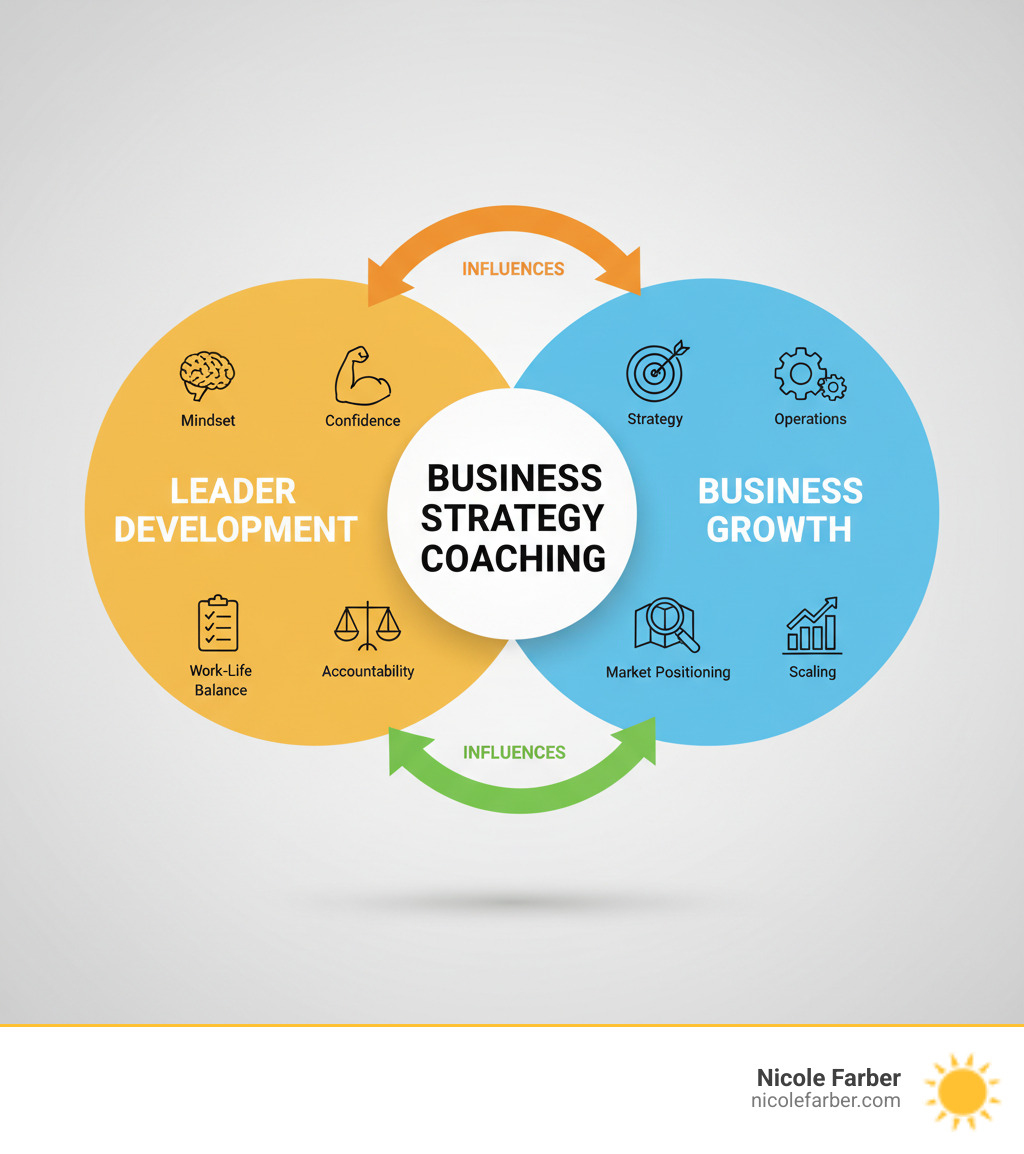Business Strategy Coaching: Coach vs. Strategist – What’s the Difference?
- Entrepreneurship
- Word of the Day
- November 17, 2025
Why Understanding the Difference Matters for Your Growth
Business strategy coaching helps entrepreneurs gain clarity, overcome obstacles, and scale their companies. It blends personalized leadership development with strategic business insights. Whether you’re a law firm partner in Philadelphia or a business owner feeling overwhelmed, understanding the difference between a business coach and a business strategist is key to choosing the right support.
Quick Answer: What is Business Strategy Coaching?
- Business Coach: Focuses on you as a leader—mindset, confidence, decision-making, and personal growth
- Business Strategist: Focuses on your business—market analysis, operational plans, growth strategies, and competitive positioning
- Business Strategy Coach: Combines both approaches to support you and your business simultaneously
Many entrepreneurs in Philadelphia, Wilkes-Barre, and beyond feel stuck or overwhelmed. The solution isn’t just working harder—it’s getting the right support at the right time.
I’m Nicole Farber, CEO of ENX2 Legal Marketing. With over 15 years of experience, I’ve used business strategy coaching to help law firms and business owners achieve sustainable growth. I’ve seen how the right partnership transforms leaders and their companies, moving them from feeling overwhelmed to confidently scaling their operations.

The Core Distinction: Coach vs. Strategist

When you need help with your business, it’s crucial to know what kind of help to get. The distinction between a business coach and a business strategist is about finding the right support, whether you’re in Philadelphia or Luzerne County. One focuses on developing you as a leader, while the other focuses on developing your business. Both are valuable, but they approach growth from different angles. Let’s break down each role.
| Feature | Business Coach | Business Strategist | Business Strategy Coach |
|---|---|---|---|
| Primary Focus | The individual (leader, entrepreneur) | The business (structure, market, operations) | Both the leader and the business |
| Methodology | Asking powerful questions, active listening, goal setting, accountability, mindset shifts | Data analysis, market research, framework creation, problem-solving, strategic planning | Blends coaching techniques with strategic analysis and planning |
| Main Goal | Personal growth, improved leadership skills, improved decision-making, work-life balance | Business growth, market advantage, operational efficiency, new revenue streams | Holistic growth for the leader and sustainable growth for the business |
| Best For | Leaders struggling with confidence, decision-making, time management, or team leadership | Businesses needing clear direction, market entry plans, scaling strategies, or operational optimization | Leaders who need personal development intertwined with robust business planning and execution |
The Role of a Business Coach: Opening Up Your Potential
A business coach is a personal trainer for your leadership skills. The focus is on you—your mindset, confidence, and decision-making. Instead of giving answers, a coach asks powerful questions to help you find your own insights. They create a safe space to explore challenges, identify blind spots, and overcome self-doubt. For instance, if you’re growing your firm in Wilkes-Barre and struggling with work-life balance or second-guessing decisions, a coach provides accountability, mindset shifts, and personal development to overcome these internal barriers. Research shows 80% of people who work with coaches report increased self-confidence, and 70% see improved work performance. As we explore in How to Be a Good Leader, great leadership starts from within.
The Role of a Business Strategist: Charting the Course for Growth
While a coach focuses on the person, a strategist focuses on the business plan. Think of them as an architect for your business, analyzing your market position and building frameworks for growth. A strategist uses data analysis, market research, and operational planning to identify opportunities and create scaling strategies. For example, a strategist can map out your expansion into new markets like New Orleans or Antigua Guatemala. They focus on competitive positioning, market entry strategies, and operational efficiency. A strategist provides a step-by-step path to refine your value proposition, find new revenue streams, and create actionable plans, as we discuss in Building a Business Development Plan.
The Hybrid Approach: The Rise of the Business Strategy Coach
What if you need both personal and business development? That’s where a business strategy coach comes in. This hybrid role combines leadership coaching with business strategy, recognizing that your business can only grow as much as you do as a leader. This holistic approach is invaluable for entrepreneurs in competitive markets like Philadelphia. A business strategy coach helps you tackle strategic challenges and personal barriers simultaneously. They help you identify blind spots that could derail your business plan and build leadership resilience while creating effective market strategies. This integrated support ensures you grow alongside your business, developing the skills and confidence to lead at every level. This is the core of Empowering Business Owners and helping them thrive.
Key Benefits and ROI of Business Strategy Coaching

When considering business strategy coaching, you want to know the ROI. For entrepreneurs from Philadelphia to Wilkes-Barre, this is a critical business decision. The returns are measurable and substantial, delivering both tangible financial results and intangible personal growth. Whether you’re in New Orleans or Luzerne County, coaching provides hard numbers for your balance sheet and the personal changes that make the journey worthwhile.
Tangible Returns: Measuring Your Investment
The data is compelling. The ICF’s 2023 Global Coaching Study found 86% of companies report a positive ROI from coaching, with one Fortune 500 firm seeing a 529% to 788% ROI. Furthermore, 96% of companies would repeat the experience. These tangible returns appear in several key areas:
- Revenue growth: Clearer strategies and better decision-making lead to improved sales.
- Profit margins: Coaching helps you identify inefficiencies and optimize resource allocation, boosting your bottom line.
- Employee retention: Stronger leadership creates a better work environment, leading to more engaged teams and lower turnover costs.
- Productivity and efficiency: A coach helps you focus your energy on what matters, accelerating growth. These are the practical approaches we cover in Key Strategies for Growing a Business.
Intangible Gains: The Personal and Professional Change
Intangible returns are just as valuable. These personal changes create the foundation for sustainable success.
- Increased self-confidence: Research shows 80% of coached individuals feel more confident, enabling them to make tough calls and lead effectively.
- Improved performance and relationships: 70% of leaders report better work performance, communication, and relationships.
- Greater clarity and focus: A coach helps you cut through the noise, align decisions with your vision, and reduce overwhelm.
- Reduced stress and burnout: By learning strategic thinking and delegation, you can move from surviving to thriving.
- Leadership resilience: Coaching builds the mental fortitude to weather storms, which is essential for Overcoming Business Challenges.
A more confident, focused leader builds a healthier, more adaptable business. That’s the real ROI, setting you up for success whether your clients are in Antigua Guatemala or closer to home.
Finding and Maximizing Your Coaching Engagement
Finding the right business strategy coaching partner is crucial. It’s a partnership built on trust and a shared commitment to your growth. The right coach can be transformative, while the wrong fit wastes time and money. Here’s how to find the right match and maximize your engagement.
What to Look for in a Top-Tier Coach or Strategist
When evaluating a coach, look for a combination of credentials, experience, and personal chemistry.
- Credentials and Experience: Look for certifications from reputable bodies like the International Coaching Federation (ICF). Learn more at What is Coaching? by the International Coaching Federation. Relevant industry experience in leadership or strategy is also a major plus.
- Proven Track Record: Ask for testimonials, case studies, or references. You want a coach who has delivered real results for clients with similar challenges, whether in Philadelphia or Wilkes-Barre.
- Essential Qualities: A great coach has strong listening skills, asks tough questions, offers an objective perspective, and provides honest, direct feedback.
- The Vetting Process: Schedule complimentary findy calls with several coaches. Assess their approach and your personal chemistry. Trust is essential, so ask for recommendations and review their published content to understand their philosophy.
Key questions to ask a potential coach:
- What is your coaching philosophy and methodology?
- Can you provide examples of how you’ve helped clients with similar challenges?
- What are your certifications and relevant experience?
- How do you measure success in a coaching engagement?
- What is the structure and cost of your programs?
Preparing for Success: How to Get the Most Out of Your Partnership
Your active participation is key to a successful coaching partnership. To get the most out of your investment:
- Define Clear Goals: Before you start, clarify your biggest challenges and what success looks like. Using SMART goals is essential for effective Strategic Goal Setting.
- Be Open and Transparent: The coaching space is confidential. The more honest you are about your challenges and vulnerabilities, the more your coach can help.
- Commit to the Process: Do the “homework” between sessions. Real change happens when you apply what you’ve learned.
- Be Ready for Change: Growth requires stepping outside your comfort zone. Be receptive to new perspectives and feedback.
- Prioritize Your Sessions: Treat coaching appointments as non-negotiable. The consistency you bring to this work, whether in Philadelphia or Luzerne County, will pay dividends.
Actively engaging in the process is how you can start Overcoming Business Challenges with a structured approach.
Common Pitfalls and How to Avoid Them
Being aware of common pitfalls can help ensure a successful coaching relationship, whether your business is in New Orleans or Antigua Guatemala.
- Poor Coach-Client Fit: A clash in personality or philosophy can derail progress. Vet coaches thoroughly and trust your gut during findy calls.
- Unclear Expectations: Ambiguous goals lead to frustration. Establish clear, written goals and expectations in a formal agreement from the start.
- Lack of Accountability: Momentum dies without accountability. Agree on milestones and a structure for tracking progress.
- Resistance to Change: Coaching won’t work if you’re not open to feedback and new approaches. Be ready to step outside your comfort zone.
- Viewing Coaching as a Quick Fix: Sustainable change takes time. Approach coaching with a long-term perspective, not as a sprint.
Avoiding these pitfalls is about putting in the groundwork. As we say, it’s about Process Before Promotion: build a solid foundation, commit to the process, and results will follow.
Frequently Asked Questions about Business Strategy Coaching
We often hear similar questions from entrepreneurs and leaders exploring business strategy coaching. These are the conversations I have regularly with business owners from Philadelphia to Antigua Guatemala, and I want to address them honestly and directly.
When is the right time to hire a business strategy coach?
While there’s no “perfect” time, clear signals indicate you’re ready for a coach:
- You feel stuck or overwhelmed: If your business has plateaued, you’re unclear on the next steps, or you’re struggling with work-life balance, a coach can provide a fresh perspective.
- You’re facing a major transition: Scaling, launching a new product, entering a new market like New Orleans, or planning succession are pivotal moments that benefit from strategic guidance.
- You need an objective viewpoint: An independent coach can challenge your assumptions and help you see opportunities and risks you’re too close to notice.
- You want to accelerate growth: Coaching helps you implement proven strategies and avoid costly mistakes, fast-tracking your success.
How is business strategy coaching different from consulting or mentoring?
It’s important to understand these distinctions:
- Coaching draws answers from you. A coach uses powerful questions to help you find your own solutions and focuses on your growth.
- Consulting provides expert answers to you. A consultant diagnoses a specific problem and provides a solution, often implementing it as well.
- Mentoring shares wisdom from personal experience. A mentor offers advice based on what worked for them.
A business strategy coach often blends all three. They use coaching techniques to clarify your vision, provide strategic frameworks like a consultant, and share wisdom like a mentor. This comprehensive support is invaluable for leaders in markets like Wilkes-Barre and Luzerne County. Learn more about this integrated approach in Business Leadership Mentor Tips 2025.
How much does business strategy coaching cost?
Costs vary significantly based on several factors:
- Coach’s Experience: Highly experienced coaches with proven track records command higher fees.
- Program Structure: One-on-one coaching is more expensive than group programs. Frequency and duration of sessions also affect the price.
- Scope of Services: Packages may include assessments, workshops, or other services that increase the investment.
In practical terms, costs can range from a few hundred dollars for a single session to several thousand per month for high-level executive coaching. This is an investment, not an expense. With studies showing an ROI of up to 788%, the initial cost often pales in comparison to the long-term returns. Most reputable coaches offer a complimentary findy call to discuss your needs and get clarity on pricing before you commit.
Conclusion: Choosing Your Path to Strategic Excellence

We’ve explored how a business coach focuses on you, a business strategist on your business, and a business strategy coach on both. The right path depends on your current needs. Perhaps you’re a law firm partner in Philadelphia struggling with delegation, or a business owner in Luzerne County needing a clear roadmap for scaling. You may need both personal growth and strategic direction to reach the next level.
As a single mother who built a business, I understand the doubt and overwhelm. I also know the incredible change that comes from having the right support—someone who helps you see possibilities you couldn’t see alone. That is the heart of coaching.
Whether you’re in Wilkes-Barre, New Orleans, or Antigua Guatemala, growth requires intentionality and guidance. It demands looking inward at your leadership while looking outward at your strategy.
If you feel stuck or ready for more, don’t wait for the “perfect moment.” The best leaders invest in themselves today. I invite you to take that next step. The right partnership can transform your trajectory. Let’s explore how we can work together to open up your potential and build the thriving business you envision.
Explore leadership development opportunities in the Wilkes-Barre area
Your path to strategic excellence starts now.

